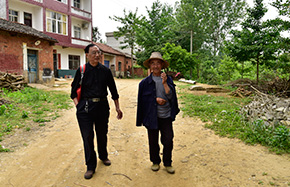National planning to tackle 'urban diseases'
In recent years, it's not been unusual to hear urban Chinese joke about enjoying a "sea view" from their homes, as cities have frequently been flooded after heavy rains in summer. Poor drainage systems in urban areas are one of the reasons for the terrible situation.
Chinese authorities now plan to cope with flooding and also keep at bay other "urban diseases", such as traffic congestion and garbage dumps in the suburbs, with guidelines in a five-year plan.
It's called The National Planning for Urban Infrastructure Construction From 2016 to 2020 and it was published Thursday by the Ministry of Housing and Urban-Rural Development and the National Development and Reform Commission, China's top economic planner. It is the first comprehensive national plan for urban construction in China, according to Zhang Linwei, deputy head of the ministry's urban construction department.
The comprehensive plan changes the previous way of drafting separate planning for the development of different infrastructure and public facilities in urban areas. This will make it easier to coordinate different government departments and get rid of the "urban diseases", including traffic congestion, black and odorous bodies of water, garbage dumps in the suburbs and waterlogging, Zhang said at a news conference on Thursday.
While building or broadening 104,000 kilometers of road, the government also will construct 112,400 kilometers of underground storm drains and new facilities capable of diverting and storing 237 million cubic meters of floodwater in the country's urban areas, according to the plan.
The plan also said new garbage disposal plants will be built to increase garbage treatment capability in Chinese urban areas by 509,700 metric tons a day. More than 90,000 trucks will be purchased nationwide to help transport garbage.
To improve urban environments, the plan requires that there should be a public garden in every diameter of 500 meters, Zhang said.
According to the plan, 160,000 and 50,000 hectares of public gardens will be built in urban areas and suburbs, respectively, and 230,000 hectares of public gardens will be upgraded.
Tan Chengwen, an official with the country's top economic planner, said at the conference that public-private partnership will be encouraged for the plan's implementation. Financial institutes of various forms will be motivated to give financial support to these public-private partnership projects.
He also said the government will give more financial support to upgrade urban infrastructure in Central China and in the western parts of the country.
- Shanghai to open 11 B&Bs near Disneyland
- Mainland welcomes Taiwan entrepreneurs in Belt & Road construction
- CPC expels former Shanghai chief procurator
- Xi hails late Chinese geophysicist Huang Danian, stresses patriotism
- Resisting reunification by force to get Taiwan nowhere: mainland spokesman


















